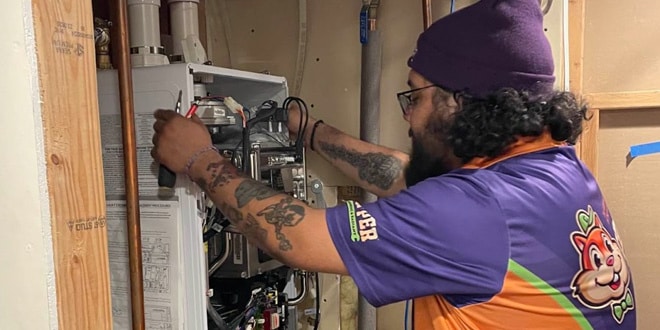
A malfunctioning water heater can disrupt your daily routine and cause significant inconvenience. Whether it’s a lack of hot water, strange noises, or leaks, understanding the root cause can help you decide on the best course of action. In this blog, we’ll explore common issues with water heaters, DIY troubleshooting tips, and when to call in the professionals at Chipper Plumbing & Radiant.
Key Topics Covered
- Common Issues with Water Heaters
- DIY Troubleshooting Tips
- Signs Your Water Heater Needs Replacement
- Maintenance Tips for Extending Water Heater Lifespan
- When to Call a Professional
- Types of Water Heaters
- Additional Services Offered by Chipper Plumbing & Radiant
- Fun Facts about Water Heaters
- FAQ
Common Issues with Water Heaters
Understanding the common problems that can affect your water heater can help you diagnose and address issues more effectively. Here are some frequent issues:
- No Hot Water: This is often caused by a faulty thermostat, a broken heating element, or a tripped circuit breaker. If the breaker is fine, you might need to replace the heating element or thermostat.
- Inadequate Hot Water: This can result from a poorly calibrated thermostat, sediment buildup in the tank, or an undersized water heater. If your household has grown or usage patterns have changed, consider upgrading to a larger unit.
- Strange Noises: Popping or rumbling noises typically indicate sediment buildup in the tank. The sediment causes the tank to overheat and produce these sounds. Regular flushing can help prevent this issue.
- Leaking Water: Leaks can occur due to a faulty valve, a corroded tank, or loose plumbing connections. Inspect all valves and connections, and if the tank itself is leaking, it may need to be replaced.
- Discolored Water: Rusty or muddy water often signifies corrosion inside the tank or the pipes. This is usually a sign that the anode rod needs to be replaced or that the tank is corroding.
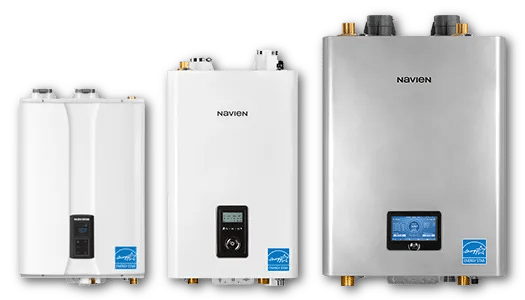
DIY Troubleshooting Tips
Before calling a professional, try these DIY troubleshooting tips to see if you can resolve the issue:
- Check the Power Supply: Ensure that your water heater is receiving power. Check the circuit breaker and reset it if necessary. For gas water heaters, make sure the pilot light is lit.
- Inspect the Thermostat: Make sure the thermostat is set to the appropriate temperature (typically 120-140 degrees Fahrenheit). Adjusting the thermostat might solve the problem of inadequate hot water.
- Flush the Tank: Sediment buildup can reduce efficiency and cause noise. Flushing the tank can help remove sediment. Attach a hose to the drain valve, run the water until it’s clear, and then refill the tank.
- Inspect for Leaks: Check around the tank and plumbing connections for any visible leaks. Tighten connections if needed. For leaks at the pressure relief valve, lifting the valve’s lever and letting it snap back might resolve minor leaks.
- Test the Pressure Relief Valve: Lift the valve’s lever and let it snap back. If water doesn’t flow out, it may need to be replaced. A faulty pressure relief valve can lead to significant water damage if not addressed.
Signs Your Water Heater Needs Replacement
Sometimes, a water heater issue might be beyond repair, indicating that it’s time for a replacement. Here are some signs to look out for:
- Age: Most water heaters last between 10 to 15 years. If yours is within this age range and experiencing issues, it might be time for a new one. Newer models are more energy-efficient and can save money in the long run.
- Frequent Repairs: If you find yourself constantly fixing your water heater, replacing it could be more cost-effective. Frequent issues often indicate that the unit is nearing the end of its lifespan.
- Rusty Water: Persistent rusty water from the hot water tap can indicate significant corrosion inside the tank. Once a tank starts to corrode, it’s only a matter of time before it leaks.
- Reduced Efficiency: If your water heater no longer provides sufficient hot water or takes longer to heat, it might be nearing the end of its life. Upgrading to a more efficient model can improve performance and reduce energy costs.
- Leaks and Corrosion: Visible leaks or corrosion around the tank are clear indicators that replacement is necessary. Even a small leak can quickly escalate, leading to water damage in your home.
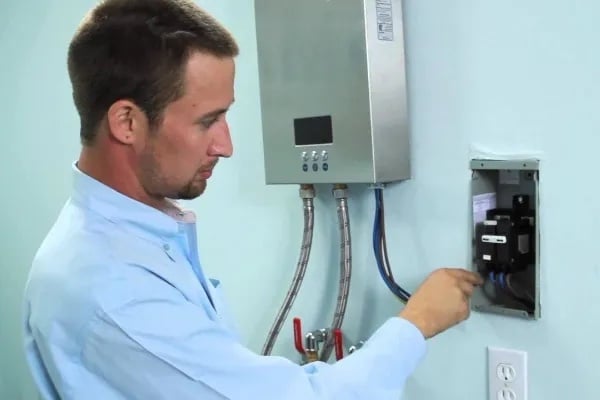
Maintenance Tips for Extending Water Heater Lifespan
Regular maintenance can significantly extend the life of your water heater. Here are some tips to keep it running efficiently:
- Flush the Tank Annually: This helps remove sediment buildup that can reduce efficiency and cause noise. Regular flushing can also improve the heater’s efficiency and lifespan.
- Inspect the Anode Rod: Check the anode rod every few years and replace it if it’s significantly corroded. The anode rod helps prevent tank corrosion by attracting corrosive elements in the water.
- Adjust the Thermostat: Set the thermostat to 120 degrees Fahrenheit to prevent overheating and reduce energy consumption. This setting is hot enough for household use but not so high that it increases energy costs or risk of scalding.
- Insulate the Pipes: Insulate hot and cold water pipes to reduce heat loss and improve efficiency. Pipe insulation can be easily installed and is relatively inexpensive.
- Schedule Professional Maintenance: Have a professional inspect and service your water heater annually to catch potential issues early. Regular professional maintenance can identify small problems before they become major issues.
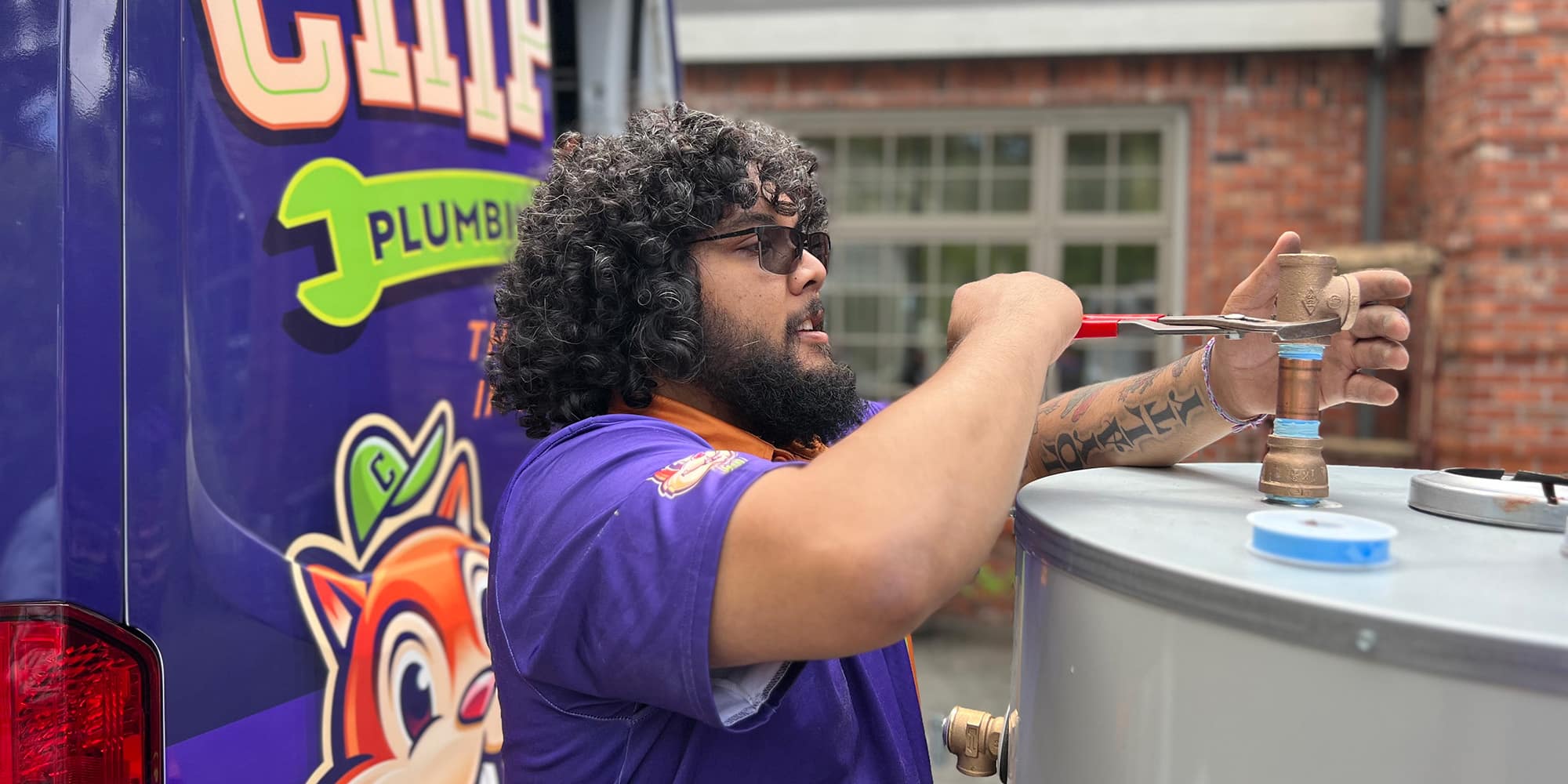
When to Call a Professional
If your DIY efforts don’t resolve the issue, it’s time to call in the experts. The team at Chipper Plumbing & Radiant is equipped to handle any water heater problems, from simple repairs to complete replacements.
Signs that you need professional assistance include:
- Persistent Issues: If problems persist despite troubleshooting efforts, a professional inspection is necessary. Persistent issues can indicate more complex problems that require expert attention.
- Water Leaks: Significant leaks can cause water damage and should be addressed immediately. A professional can quickly identify the source of the leak and recommend the best course of action.
- Strange Noises: Persistent noises after flushing the tank may indicate more serious issues. A professional can diagnose and fix the underlying problem to prevent further damage.
- Old Water Heater: If your water heater is over 10-15 years old, it may be time for a replacement. Professionals can help you choose and install a new, more efficient model.
Types of Water Heaters
There are various types of water heaters available, each with its own advantages. Here’s a comparison to help you understand your options:
| Type of Water Heater | Description | Benefits |
| Traditional Tank | Stores and heats a large volume of water | Reliable, cost-effective |
| Tankless | Heats water on demand, no storage tank | Energy-efficient, continuous hot water |
| Solar | Uses solar panels to heat water | Environmentally friendly, reduces bills |
| Heat Pump | Uses electricity to move heat from the air | Highly energy-efficient |
| Condensing | Uses exhaust gasses to heat water | Efficient, reduces energy waste |
Additional Services Offered by Chipper Plumbing & Radiant
Chipper Plumbing & Radiant offers a wide range of services to keep your home’s plumbing and heating systems in top shape. In addition to water heater services, we provide:
- Plumbing Services: Comprehensive plumbing solutions for all your home’s needs. From leak repairs to new installations, we’ve got you covered.
- Drain Clearing Services: Efficient removal of clogs and blockages to keep your drains flowing smoothly. Our advanced tools and techniques ensure thorough cleaning.
- Sewer Line Services: Professional sewer line repair and replacement to prevent and resolve major plumbing issues. We use the latest technology for accurate diagnosis and efficient repairs.
For more information or to schedule an appointment, visit our contact page.

Fun Facts about Water Heaters
- First Modern Water Heater: The first automatic storage water heater was invented by Edwin Ruud in 1889, revolutionizing home comfort.
- Energy Usage: Water heating is the second largest energy expense in your home, accounting for about 18% of your utility bill. Upgrading to an energy-efficient model can significantly reduce these costs.
- Tankless Heaters: Tankless water heaters provide hot water on demand and can be more energy-efficient than traditional tank models, offering potential savings on your energy bill.
- Solar Water Heaters: Solar water heaters use the sun’s energy to heat water and can significantly reduce energy costs. They are an eco-friendly option that can decrease your carbon footprint.
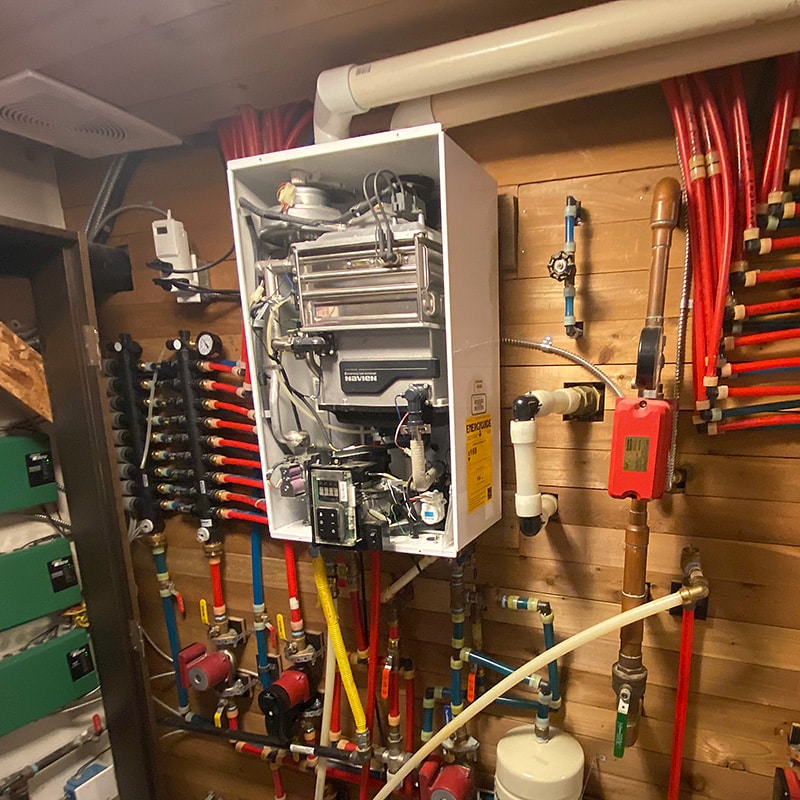
FAQ
Q: How often should I flush my water heater?
A: It’s recommended to flush your water heater at least once a year to remove sediment buildup and improve efficiency. Regular flushing can also extend the lifespan of your unit.
Q: Why is my water heater making popping noises?
A: Popping noises usually indicate sediment buildup in the tank. Flushing the tank can often resolve this issue. If the noise persists, it may be time to call a professional for further inspection.
Q: What should I do if my water heater is leaking?
A: If you notice significant leaks, turn off the power supply and water source, and call a professional plumber immediately to prevent water damage. A professional can diagnose and fix the source of the leak.
Q: How long does a typical water heater last?
A: Most water heaters last between 10 to 15 years. Regular maintenance can help extend their lifespan. If your unit is nearing this age range and experiencing issues, consider replacing it.
A malfunctioning water heater can be a major inconvenience, but with the right troubleshooting steps, you can often resolve the issue yourself. If problems persist, don’t hesitate to reach out to Chipper Plumbing & Radiant for professional help. For more information or to schedule a service, visit our contact page. Ensure your home stays comfortable and efficient with Chipper Plumbing & Radiant!
